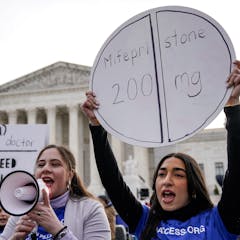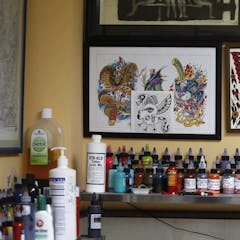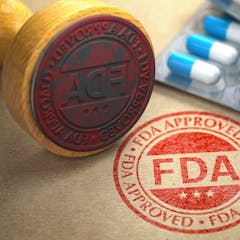
Articles sur Food and Drug Administration (FDA)
Affichage de 1 à 20 de 161 articles

Five livestock experts who study infectious diseases in the dairy industry explain the risks.

‘Natural’ isn’t the same thing as healthful. You can have too much of a good thing, and taking action can be worse than doing nothing.

Two legal scholars who study abortion-related laws explain what happened at the Supreme Court in a case that could make it harder to get an abortion.

Some tattoo inks contain unlabeled materials that can cause allergic reactions.

Once available, Opill will be the most effective form of nonprescription birth control on the market. But you should still speak with your health care provider about any questions.

An inhaler that costs nearly $300 in the US goes for just $9 in Germany. What gives?

The US Food and Drug Administration has just approved the first ever drug to treat frostbite: iloprost.

Most people don’t know what these labels really mean − and advertisers take advantage of that fact.

Although most Americans believe dietary supplements are safe, these products often make health claims that are unproven or downright false.

Tianeptine is dangerous as an active ingredient, but the products containing it have no quality control and could be contaminated with metals, microorganisms or other undisclosed drugs.

A bacterial contamination of the work environment at facilities that produce eye drops can lead to severe infections and even death, as was the case earlier in 2023.

The US Food and Drug Administration has reported that the decongestant phenylephrine, taken in oral form, does not work.

Only time and data will tell whether the CDC-recommended reformulated shots can stand their ground against the ever-changing SARS-CoV-2 variants.

The COVID-19 pandemic may have played a considerable role in the uptick of adults being treated for ADHD. But more data is needed to determine whether the trends will continue.

An expert panel found a potential association with liver cancer, but too little research exists to assume a causal connection. For now, the WHO left current consumption guidelines unchanged.

The shortages, which have been going on for years, have typically affected only low-cost generics rather than profitable brand-name drugs.

The new over-the-counter pill is highly effective at preventing pregnancy but must be taken at the same time daily, which can be a limitation for some people.

With the approval of the first over-the-counter oral contraceptive, pharmacists stand to play an ever-increasing role in helping expand access to reproductive health care in the post-Roe era.

In 1983, during the early days of the AIDS epidemic, the US Food and Drug Administration made the decision to ban gay men from donating blood. Now, 40 years later, it is dropping that rule.

The newly approved RSV vaccine could be rolled out by fall 2023, in time for the typical winter surge in RSV infections.
